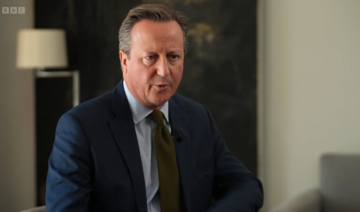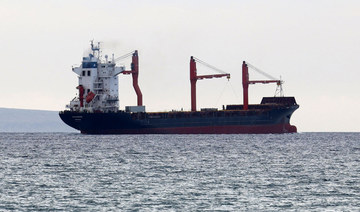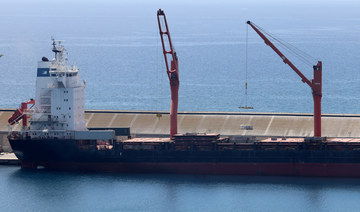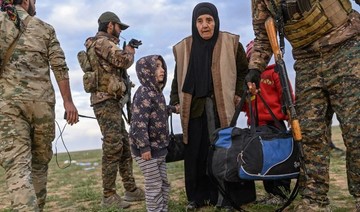BEITUNIA, West Bank: Over three dozen Palestinian prisoners returned home to a hero’s welcome in the occupied West Bank on Friday following their release from Israeli prisons as part of a cease-fire deal between Israel and Hamas.
The procession of freed prisoners, some accused of minor offenses and others convicted in attacks, at a checkpoint outside of Jerusalem stoked massive crowds of Palestinians into a chanting, clapping, hand-waving, screaming frenzy.
Fifteen dazed young men, all in stained grey prison sweatsuits and looking gaunt with exhaustion, glided through the streets on the shoulders of their teary-eyed fathers as fireworks turned the night sky to blazing color and patriotic Palestinian pop music blared.
Some of those released were draped in Palestinian flags, others in the green flags of Hamas. They flashed victory signs as they crowd-surfed.
“I have no words, I have no words,” said newly released 17-year-old Jamal Brahma, searching for something to say to the hordes of jostling journalists and thousands of chanting Palestinians, many in national dress. “Thank God.”
Tears fell down his father Khalil Brahma’s cheeks as he brought his son down from his shoulders and looked him in the eye for the first time in seven months. Israeli forces had arrested Jamal at his home in the Palestinian city of Jericho last spring and detained him without charge or trial.
“I just want to be his father again,” he said.
The release of the Palestinian prisoners from Israeli jails came just hours after two dozen hostages, including 13 Israelis, were released from captivity in Gaza in the initial exchange of Israeli hostages and Palestinian prisoners during the four-day cease-fire that started Friday.
Under the deal, Hamas is to release at least 50 hostages, and Israel 150 Palestinian prisoners, over the four days. Israel said the truce can be extended an extra day for every additional 10 hostages freed.
Although the atmosphere was festive in the town of Beitunia near Israel’s hulking Ofer Prison in the West Bank, people were on edge.
The Israeli government has ordered police to shut down celebrations over the release. Israeli security forces at one point unleashed tear gas canisters on the crowds, sending young men, old women and small children sprinting away as they wept and screamed in pain.
“The army is trying to take this moment away from us but they can’t,” Mays Foqaha said as she tumbled into the arms of her newly released 18-year-old friend, Nour Al-Taher from Nablus, who was arrested during a protest in September at the Al Aqsa Mosque in Jerusalem. ”This is our day of victory.”
The Palestinian detainees freed Friday included 24 women, some of whom had been sentenced to years-long prison terms over attempted stabbings and other attacks on Israeli security forces. Others had been accused of incitement on social media.
There were also the 15 male teenagers, most of them charged with stone-throwing and “supporting terrorism,” a broadly defined accusation that underscores Israel’s long-running crackdown on young Palestinian men as violence surges in the occupied territory.
For families on both sides of the conflict, news of the exchange — perhaps the first hopeful moment in 49 days of war — stirred a bittersweet jumble of joy and anguish.
“As a Palestinian, my heart is broken for my brothers in Gaza, so I can’t really celebrate,” said Abdulqader Khatib, a UN worker whose 17-year-old son, Iyas, was placed last year in “administrative detention,” without charges or trial and based on secret evidence. “But I am a father. And deep inside, I am very happy.”
Israel is now holding an all-time high of 2,200 Palestinians in administrative detention, according to the Palestinian Prisoners’ Club, an advocacy group, in a controversial policy that Israel defends as a counter-terrorism measure.
Since Oct. 7, when Hamas took roughly 240 Israeli and foreign citizens hostage and killed 1,200 Israelis in its unprecedented rampage through southern Israel, Palestinians have wondered about the fate of their own prisoners.
Israel has a history of agreeing to lopsided exchanges. In 2011, Hamas got Israeli Prime Minister Benjamin Netanyahu to release more than 1,000 Palestinian prisoners in exchange for a single captive Israeli soldier, Gilad Schalit.
A prisoner release touches Palestinian society to its core. Almost every Palestinian has a relative in jail – or has been there himself. Human rights groups estimate that over 750,000 Palestinians have passed through Israeli prisons since Israel captured the West Bank, Gaza and east Jerusalem in 1967.
Whereas Israel views them as terrorists, Palestinians refer to them by the Arabic word for prisoners of war, and devote a good chunk of public funds to supporting them and their families. Israel and the US have condemned the grants to prisoner families as an incentive for violence.
“These kinds of prisoner exchanges are often the only hope families have to see their sons or fathers released before many years go by,” said Amira Khader, international advocacy officer at Addameer, a group supporting Palestinian prisoners. “It’s what they live for, it’s like a miracle from God.”
Since the Hamas attack, Israel has escalated a months-long West Bank crackdown on Palestinians suspected of ties to Hamas and other militant groups. Many prisoners are convicted by military courts, which prosecute Palestinians with a conviction rate of more than 99 percent. Rights groups say Palestinians are often denied due process and forced into confessions.
There are now 7,200 Palestinians in Israeli prison, said Qadura Fares, the director of the Palestinian Prisoners’ Club, with over 2,000 arrested since Oct. 7 alone.
On Friday in Beitunia, a lanky and pimpled 16-year-old, Aban Hammad, stood unmoving, looking shaken by the tumult of tears, hugs and pro-Hamas chants around him. It was his first glimpse of the world after a year in prison for throwing stones in the northern town of Qalqilya. He was freed even though he had eight months of his sentence left to serve.
He turned toward his father, wrapping him into a hug. “Look, I’m almost bigger than you now,” he said.






























